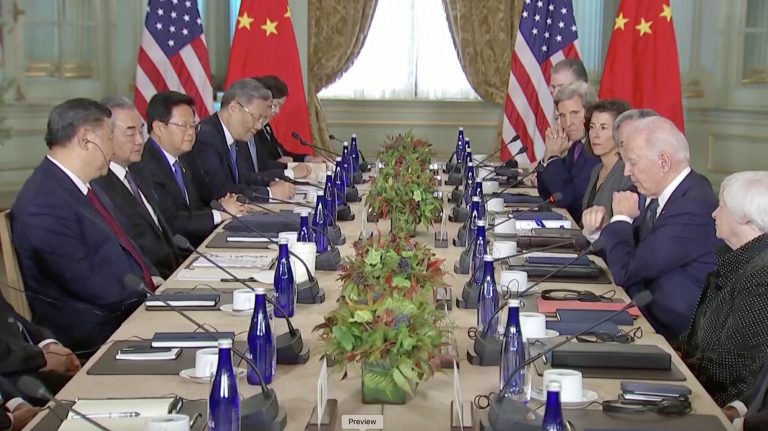Recent diplomatic activity between the United States and Communist China, including the high-profile Nov. 15 meeting in San Francisco between U.S. President Joe Biden and his Chinese counterpart Xi Jinping, has focused public attention on hopes for improvement in cross-Pacific tensions.
The two leaders last met almost one year to the day, when they spoke “about their respective priorities and intentions across a range of issues” on the sidelines of the G20 summit in Bali, Indonesia, on Nov. 14, 2022.
U.S. officials hope that this year’s meeting between Biden and Xi, which is taking place during the Asia-Pacific Economic Cooperation (APEC) summit, will elicit closer cooperation from Beijing on issues such as cross-military communications and the fentanyl trade — the deadly opioid crisis in large part stoked by Chinese-sourced chemicals.
The Chinese Communist Party (CCP), for its part, has made a variety of gestures to display goodwill, though top cadres warn Washington against stepping on the Party’s “red lines,” and stress that the path to reconciliation “won’t be smooth sailing.”
More talk, but still no concrete action
Biden welcomed Xi at the Filoli estate, a country house and gardens about 30 miles south of San Francisco. He stressed the importance of ensuring that U.S.-China competition be managed “responsibly” so as to “not veer into conflict.”
Success
You are now signed up for our newsletter
Success
Check your email to complete sign up
The Chinese leader, meanwhile, said in reference to the U.S.-China relationship that “it is unrealistic for one side to remodel the other, and conflict and confrontation has unbearable consequences for both sides.”
PREVIOUS REPORTING ON THE SINO-US RELATIONSHIP
- Xi to Meet Biden During APEC Summit in San Francisco
- US Implements Export Rules for AI Chips as Global Tech War Heats Up
- China Considers Renewing Boeing 737 Max Purchases Amid High-Stakes APEC Summit
A White House statement said the leaders “held a candid and constructive discussion on a range of bilateral and global issues and exchanged views on areas of difference.” Biden added in a post on X: “There are critical global challenges that demand our joint leadership. And today, we made real progress,” he said.
But while the leaders may seek to reduce frictions, the disagreements between Washington and Beijing only continue to deepen as the CCP pursues its totalitarian ideological agenda.
In its 2023 annual report, released same day as the Xi-Biden meeting, the U.S.-China Economic and Security Review Commission (USCC) observed that despite the “short-term ups and downs of the relationship” that preoccupied public discussion throughout much of the year, “the underlying reality was that, amid these ups and downs, the rivalry between the United States and China was intensifying.”
“Beijing continues to reject cooperation with the United States on fundamental questions of national security, economics or trade,” the introduction to the report’s executive summary reads, while noting that the communist regime gives no sign of altering its policies, either at home or abroad.”
‘Delay and wait for change’
The USCC report takes into account the duplicitous nature of the Chinese regime, observing that even as the Communist Party holds out an olive branch to Washington, it has been building up its military strength and technologies, tightening political controls at home, stepping up aggression in the East Asian region, and assembling a bloc of authoritarian countries in a clear challenge to the American-led global order.
“China now appears to view diplomacy with the United States primarily as a tool for forestalling and delaying U.S. pressure over a period of years” as the CCP handles rising economic and societal challenges, the report reads.
- US Officials Highlight Depth of China’s Economic Crisis
- Chinese Persecution Survivor Warns of Transnational Repression in the West
Observers of CCP politics have noted the Party’s propensity to talk up diplomatic or even reform-minded solutions when faced with internal turbulence or external challenges. One Chinese phrase used to describe Beijing’s strategy is “delay and wait for change” (以拖待變), that is, to buy time.
Despite its rallying of countries opposed to the West such as Russia and Iran, the People’s Republic of China (PRC) faces steep difficulties at home. The USCC noted that despite removing all of its “zero-COVID” restrictions that kept much of China under strict lockdowns for three years, the CCP has not seen much of an economic rebound.
“U.S.-China ties could be influenced next year by changing developments inside China, including the possibility that the Chinese economy could experience a deep slump. Amid these uncertainties and the continuing talk of ‘tensions’ and ‘thaws’ between the United States and China, the prospects for 2024 are for continuing strategic competition and an intensifying systemic rivalry between the two countries,” the USCC report reads.
The report also recommended the United States to push back against the PRC’s aggression and human rights abuses, rather than merely accept the “new normal” of “ever-hardening policies” by the Communist Party and “its ever-tightening control over the Chinese people.”
“Unless and until Beijing changes course, it will not be possible to achieve a genuine improvement in
relations.”
















